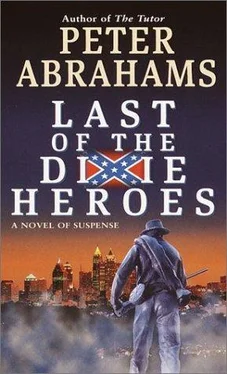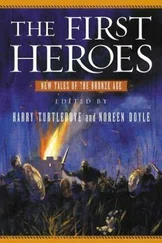Peter Abrahams - Last of the Dixie Heroes
Здесь есть возможность читать онлайн «Peter Abrahams - Last of the Dixie Heroes» весь текст электронной книги совершенно бесплатно (целиком полную версию без сокращений). В некоторых случаях можно слушать аудио, скачать через торрент в формате fb2 и присутствует краткое содержание. Жанр: Триллер, на английском языке. Описание произведения, (предисловие) а так же отзывы посетителей доступны на портале библиотеки ЛибКат.
- Название:Last of the Dixie Heroes
- Автор:
- Жанр:
- Год:неизвестен
- ISBN:нет данных
- Рейтинг книги:4 / 5. Голосов: 1
-
Избранное:Добавить в избранное
- Отзывы:
-
Ваша оценка:
- 80
- 1
- 2
- 3
- 4
- 5
Last of the Dixie Heroes: краткое содержание, описание и аннотация
Предлагаем к чтению аннотацию, описание, краткое содержание или предисловие (зависит от того, что написал сам автор книги «Last of the Dixie Heroes»). Если вы не нашли необходимую информацию о книге — напишите в комментариях, мы постараемся отыскать её.
Last of the Dixie Heroes — читать онлайн бесплатно полную книгу (весь текст) целиком
Ниже представлен текст книги, разбитый по страницам. Система сохранения места последней прочитанной страницы, позволяет с удобством читать онлайн бесплатно книгу «Last of the Dixie Heroes», без необходимости каждый раз заново искать на чём Вы остановились. Поставьте закладку, и сможете в любой момент перейти на страницу, на которой закончили чтение.
Интервал:
Закладка:
“And who would I be servicing?”
“Who would you be servicing? I don’t get you, Roy. The customers, the ones who bring their cars in for- Roy? What’s that?”
“What’s what?”
“Sounds like it’s coming from your end.”
“I don’t hear anything.”
“An alarm maybe.”
Roy heard it now. He went upstairs. A high-pitched sound. Roy followed it into the living room, which was on fire.
“Roy? Roy? Everything okay?”
Or some other annoyance. Roy tossed the cell phone into the conflagration. Burn, he thought, burn until there’s nothing left but ashes, and out of the rubble would rise… what? Roy couldn’t find a good answer to that question. Then came a little vision from the future: Rhett’s face as he listened to the story of how the house he’d grown up in burned down.
The next thing Roy knew he had the garden hose pulled in through the window and trained on the fire, nozzle turned to maximum pressure. That got the flames angry; they swelled up, assuming individual personalities. Roy got angry too. He strode in among them, attacking the most belligerent first, shooting them down with water until they all flickered and died away. Smoke boiled up, filled the room. Roy ripped out the smoke detectors to stop the hideous noise, closed all the doors and windows, went into the bathroom.
He gulped water from the tap, splashed some on his face, glimpsed some disgusting loser on the shiny silver faucet. Could it be? Roy straightened, looked in the mirror, took in the shocking sight: a disgrace to the uniform, the heritage, the memory.
Roy stripped off his smoky, filthy underwear, had a long hot shower, shaved, had another shower, longer and hotter, then dried himself, combed his hair, shook on some powder, checked the mirror again. Better, but a long way from right. He put on the uniform: much closer. The disgusting loser was gone; the face, so weird before, was hardening into something he could live with. Roy left the bathroom-already moving in that free and easy way he had in his uniform-and smelled smoke in the hall. The intellectual part of him knew it was all that remained of the fire, now out. The soul part, to use Lee’s expression, recognized the smoke of his personal Atlanta, burned to the ground. He’d smelled this fire ahead of time, up at the Mountain House. Roy stuck his finger in the little hole in the jacket, worried at the threads. What else had she said about the soul part? Unconquered, unoccupied, waiting.
Someone was knocking at the door. Roy went to answer, preparing remarks about something left in the oven. He was feeling better now, better with every heartbeat.
“Nothing to worry about,” he began as he opened the door.
It was Curtis.
Curtis in the early morning, or possibly early evening. Roy couldn’t help staring, staring at that suit, that tie, that shirt, all so perfect, like a princely costume from an exciting era he couldn’t quite place. Curtis was staring at him too. Roy straightened his kepi.
“Maybe this isn’t a good time,” Curtis said.
“For what?”
“I’ve been trying to reach you, Roy.”
“Phone problems,” Roy said. “Very bad.”
“I couldn’t get you on email, either.”
“Nope.”
“Are you all right, Roy? Looks like you lost some weight.”
“Fatty tissue,” Roy said. He was going to add something about fighting trim, but reconsidered.
“I can’t help wondering about what you’re wearing,” Curtis said.
“Mutual,” said Roy.
“Can I come in?” Curtis said. “I’d like to talk.”
Roy was on the point of saying no, citing oven problems, when he happened to notice all the trash on his lawn. It confused him. “Why not?” Roy said. “You’re a good talker.” He motioned Curtis inside.
Curtis didn’t move. His eyelid fluttered, the way it sometimes did. “What do you mean by that?”
“I always liked hearing you talk,” Roy said. It was true. Curtis made sense, and when he got rolling he sounded like a preacher. Roy wondered whether he knew “Milky White Way.”
“A bit messy,” Roy said as Curtis followed him inside. “Lacking a woman’s touch.”
“Everywhere’s like that nowadays,” Curtis said, “women or not.”
Roy understood perfectly. “That’s a Yankee thing,” he said.
“I’m sorry?”
“Nothing.”
They sat down at the kitchen table. Curtis sniffed the air.
“Overcooking problem,” Roy said.
“The reason I wanted to talk to you,” Curtis said, “one of the reasons, is I got a report that you haven’t taken advantage of the career counseling program.”
“You know about something like that?”
“I make it my business to.”
“That’s a kindness,” Roy said, adopting for the first time in his life one of his ma’s pet phrases. “But there’s no need to worry about me.”
“You’ve landed on your feet, then?” Curtis said.
“All set.”
“What as, Roy, if you don’t mind my asking?”
Roy sniffed the air. He too smelled smoke. “Be right back,” he said. He went down the hall, opened the living room doors, looked in. The smoke didn’t seem quite so thick now, but little fires flickered here and there, harmless. Roy stamped them out and went back to the kitchen. Curtis was looking through the diary of Roy Singleton Hill.
Roy didn’t like that. Roy plural.
“That’s the war diary of my ancestor, Roy Singleton Hill,” Roy said. “The writing is typical of the period.”
“Probably better than mine,” Curtis said.
“Yours?” Roy didn’t get that at all: Curtis was known for the quality of his memos.
“My ancestors’ writing,” Curtis said. “They were… on the scene too.”
“One of those facts of life,” Roy said.
“Definitely.”
They stared at each other across the table. Roy realized that if the conversation went a certain way they could come to blows. He knew himself now, knew the Roy inside: Curtis wouldn’t stand a chance. Too bad because Roy liked him, always had. But why was Curtis pushing him like this?
“Are you a reenactor now, Roy?” Curtis’s eyelid fluttered. “Like Gordo?”
“No.” He didn’t like the way Curtis said Gordo’s name.
“There are slave reenactors.”
“You mentioned that.”
“Big contingent going up to Chattanooga for the Lookout Mountain event.”
“And that,” said Roy. “You thinking of joining them?”
“I hadn’t seen the necessity.”
“What necessity?” Roy said.
“Of making sure the blanks get filled in.” Curtis turned to the end of the diary. “Did you notice how the last page is torn out?”
“Looks that way.”
“Did you do it, Roy?”
“This is my inheritance,” Roy said. “Why would I damage it?”
“Maybe you didn’t like what was written there,” Curtis said. “Have you read these final entries?”
“Scanned them,” Roy said.
“Scanned them?”
“Looked them over.”
Curtis nodded. “It’s history, a diary like this.”
“A part of it.”
“Living history-isn’t that what reenactors say they’re up to?”
“Don’t know about that.”
“Do you know about Fort Pillow?”
“I’ve heard of it.”
“What have you heard?”
“What’s written in there. It was a Union fort on the Mississippi.”
Curtis read: “ ‘Twelve April, 1864, Fort Pillow. Best day of this
…’ “ Curtis struggled to make out a word. “ ‘… conflict so far. Forrest asks for unconditional’-I think that’s what it says-’surrender but they refuse.’ “ Curtis read that part in his normal, educated voice. But as he went on, he began sounding more and more like a dumb cracker. “ ‘And thems tauntin’ us from over the walls. So’s we charge down from the east and Thunder takes a ball in the neck. I got my finger on the blood vessel and keeps ridin’ until Thunder goes down. We comin’ in over the walls shootin’ and hollerin’. Now theys thinkin’ twicet bout not surrenderin’ but we has our orders from Forrest and they was to-’ “ Curtis looked up. “Which is where the diary ends.”
Читать дальшеИнтервал:
Закладка:
Похожие книги на «Last of the Dixie Heroes»
Представляем Вашему вниманию похожие книги на «Last of the Dixie Heroes» списком для выбора. Мы отобрали схожую по названию и смыслу литературу в надежде предоставить читателям больше вариантов отыскать новые, интересные, ещё непрочитанные произведения.
Обсуждение, отзывы о книге «Last of the Dixie Heroes» и просто собственные мнения читателей. Оставьте ваши комментарии, напишите, что Вы думаете о произведении, его смысле или главных героях. Укажите что конкретно понравилось, а что нет, и почему Вы так считаете.












